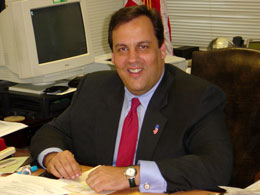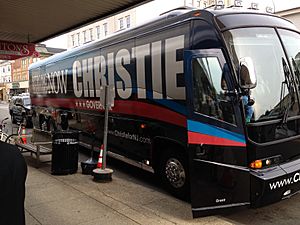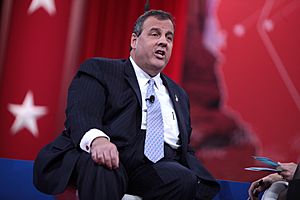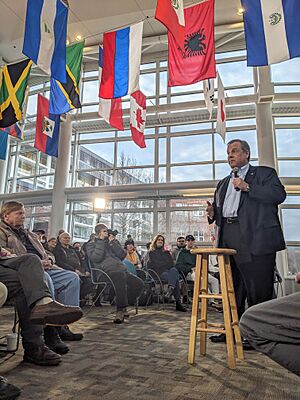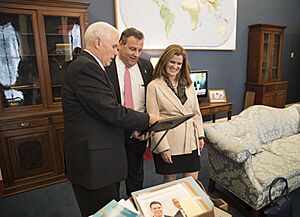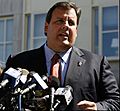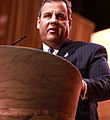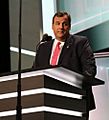Chris Christie facts for kids
Quick facts for kids
Chris Christie
|
|
|---|---|
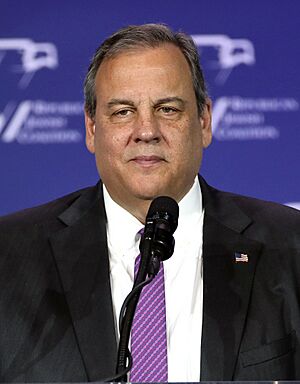
Christie in 2023
|
|
| 55th Governor of New Jersey | |
| In office January 19, 2010 – January 16, 2018 |
|
| Lieutenant | Kim Guadagno |
| Preceded by | Jon Corzine |
| Succeeded by | Phil Murphy |
| Chair of the Opioid and Drug Abuse Commission | |
| In office March 29, 2017 – November 1, 2017 |
|
| President | Donald Trump |
| Preceded by | Position established |
| Succeeded by | Position abolished |
| Chair of the Republican Governors Association | |
| In office November 21, 2013 – November 20, 2014 |
|
| Preceded by | Bobby Jindal |
| Succeeded by | Bill Haslam |
| United States Attorney for the District of New Jersey | |
| In office January 17, 2002 – December 1, 2008 |
|
| President | George W. Bush |
| Preceded by | Robert J. Cleary |
| Succeeded by | Ralph Marra |
| Member of the Morris County Board of Chosen Freeholders | |
| In office January 1, 1995 – December 31, 1997 |
|
| Preceded by | Edward Tamm |
| Succeeded by | John J. Murphy |
| Personal details | |
| Born |
Christopher James Christie
September 6, 1962 Newark, New Jersey, U.S. |
| Political party | Republican |
| Spouse |
Mary Pat Foster
(m. 1986) |
| Children | 4 |
| Education | University of Delaware (BA) Seton Hall University (JD) |
| Signature | |
Christopher James Christie (born September 6, 1962) is an American politician and lawyer. He served as the 55th governor of New Jersey from 2010 to 2018. As a member of the Republican Party, he also worked as a top lawyer for New Jersey. He ran for the Republican presidential nomination in 2016 and 2024.
Christie was born and raised in New Jersey. He graduated from the University of Delaware and later earned a law degree from Seton Hall University School of Law. His political career began when he volunteered for Republican Thomas Kean's campaign for governor in 1981. In 1994, Christie was elected to a local government position in Morris County, New Jersey.
After working on George W. Bush's 2000 presidential campaign, President Bush appointed Christie as the U.S. Attorney for New Jersey. He held this job from 2002 to 2008. During this time, his office was known for successfully prosecuting many public officials for corruption.
In 2009, Christie was elected governor of New Jersey, defeating the current governor, Jon Corzine. During his first term, he was praised for cutting government spending and for his leadership after Hurricane Sandy. He was easily re-elected in 2013. His second term included some controversies, like the Fort Lee lane closure scandal.
Christie ran for president in 2016 but ended his campaign after a poor result in the New Hampshire primary. He later supported Donald Trump and led Trump's transition team for a time. Although he was an ally of Trump, he became a strong critic after the 2020 United States presidential election. In 2023, he announced his second campaign for president, where he was known for his sharp criticism of Trump. He dropped out of the race before any votes were cast.
Early Life and Schooling
Chris Christie was born on September 6, 1962, in Newark, New Jersey. His mother, Sondra, was a telephone receptionist, and his father, Wilbur, was an accountant. His family moved to Livingston, New Jersey, where he grew up.
In high school, Christie was the class president and played catcher on the baseball team. He became interested in politics after hearing a speech by politician Thomas Kean. This inspired him to volunteer for Kean's campaign for governor.
Christie went to the University of Delaware and graduated in 1984 with a degree in political science. While there, he was president of the student government. He then went to Seton Hall University School of Law and earned his law degree in 1987.
Early Career in Law and Politics
After law school, Christie joined a law firm in New Jersey. He became a partner in the firm in 1993. He specialized in areas like election law and government affairs. From 1999 to 2001, he also worked as a lobbyist, representing companies to the state government.
In 1994, Christie was elected to the Board of Chosen Freeholders (now called county commissioners) in Morris County, New Jersey. As a freeholder, he worked to make government more transparent. For example, he led an effort to stop county officials from accepting gifts from companies doing business with the county.
He ran for a seat in the New Jersey General Assembly in 1995 but lost in the Republican primary. In 1997, he also lost his re-election campaign for the freeholder board. After these losses, he focused on his law career.
United States Attorney
In 2001, President George W. Bush appointed Christie as the U.S. Attorney for the District of New Jersey. This made him the top federal lawyer for the state. He served in this role from 2002 to 2008.
Christie made fighting public corruption his top priority after terrorism. His office successfully prosecuted over 130 public officials from both political parties. These officials were from local, county, and state governments.
Some of his most famous cases included the prosecutions of former Newark mayor Sharpe James and State Senator Wayne R. Bryant. He also prosecuted the planners of a plot to attack the Fort Dix military base in 2007. Christie has often called this case a highlight of his career.
Governor of New Jersey (2010–2018)
Christie ran for governor of New Jersey in 2009. He won the Republican primary and went on to defeat the current Democratic governor, Jon Corzine, in the general election. He took office on January 19, 2010.
In 2013, Christie was re-elected by a large margin, defeating Democratic candidate Barbara Buono.
Key Policies and Events
As governor, Christie focused on several key issues. He promised not to raise major taxes like income tax or sales tax. He also signed a law to limit how much property taxes could increase each year.
One of his major achievements was reforming the state's pension system for public employees. The changes required government workers to contribute more to their retirement and health benefits. This was projected to save the state billions of dollars over 30 years.
Christie also made changes to education. He supported charter schools and signed a law that reformed the tenure system for public school teachers. This made it easier to reward good teachers and remove those who performed poorly.
In 2013, Christie signed a bill that legalized online gambling in New Jersey. He believed this would bring more money to the state. He also signed a bill to legalize sports betting in 2014.
Hurricane Sandy Response
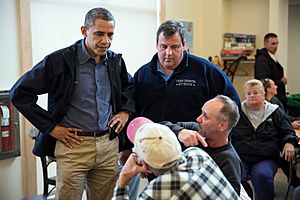
In October 2012, Hurricane Sandy caused massive damage to New Jersey. Christie's leadership during the storm's aftermath was widely praised. He worked closely with President Barack Obama to get federal aid for the state. His approval ratings soared to their highest point after the hurricane.
Fort Lee Lane Closure Scandal
In September 2013, a major controversy known as "Bridgegate" occurred. Two of the three lanes leading from Fort Lee, New Jersey, to the George Washington Bridge were closed without warning. This caused huge traffic jams for five days.
Investigations later found that the closures were ordered by some of Christie's top aides. Many believed it was done to punish the Democratic mayor of Fort Lee for not supporting Christie's re-election. Christie said he knew nothing about the lane closures beforehand. The scandal led to the resignation or firing of several of his staff members and hurt his approval ratings.
Presidential Campaigns
Christie was often seen as a potential presidential candidate. He was considered for the 2012 election but decided not to run. Instead, he supported Mitt Romney.
2016 Presidential Campaign
On June 30, 2015, Christie announced he was running for the Republican nomination for president. However, his campaign did not gain much support. He dropped out of the race in February 2016 after a poor showing in the New Hampshire primary.
After ending his campaign, he endorsed Donald Trump. Trump later named Christie to lead his transition team. However, Christie was later replaced by Mike Pence.
2024 Presidential Campaign
On June 6, 2023, Christie announced his second run for president. This time, his campaign was very different. He became one of Donald Trump's harshest critics among the Republican candidates. He often attacked Trump for his actions related to the 2020 United States presidential election and the January 6 Capitol attack.
During his campaign, Christie visited Ukraine to show support against the Russian invasion. He also visited Israel after the Hamas attack on October 7, 2023.
On January 10, 2024, Christie ended his presidential campaign. He said he did not want to split the anti-Trump vote in the primaries.
Life After Governorship
After leaving office in January 2018, Christie joined ABC News as a contributor. He also wrote a book called Let Me Finish, which was published in 2019.
He started a lobbying firm in 2018 but closed it in 2021. Christie has remained active in politics. He endorsed a candidate for the 2025 New Jersey governor's race. In 2024, he began teaching a course on political campaigns at Yale University.
Personal Life
Christie married Mary Pat Foster in 1986. They met as students at the University of Delaware. Mary Pat had a successful career in investment banking. They have four children: Andrew, Sarah, Patrick, and Bridget. The family lives in Mendham Township, New Jersey.
Christie is a big sports fan. He cheers for the New York Mets, New York Knicks, New York Rangers, and Dallas Cowboys. He is also a well-known fan of musician Bruce Springsteen and has attended many of his concerts.
In February 2013, Christie had lap-band surgery to help him lose weight. In October 2020, he tested positive for COVID-19 and was hospitalized for a week as a precaution because he has asthma.
Images for kids
-
Christie speaking to reporters in Hoboken about indictments against former Newark mayor Sharpe James in July 2007
-
Christie with former President George W. Bush and Leroy Petry in September 2011
-
The George Washington Bridge over the Hudson River, looking west from Manhattan to Fort Lee
-
Governor Chris Christie campaigning with Arizona gubernatorial candidate Doug Ducey in 2014
-
Governor Chris Christie speaking at the 2014 Conservative Political Action Conference (CPAC) in National Harbor, Maryland
-
Christie speaking at the 2016 Republican National Convention
See also
 In Spanish: Chris Christie para niños
In Spanish: Chris Christie para niños
- Electoral history of Chris Christie
 | James B. Knighten |
 | Azellia White |
 | Willa Brown |


